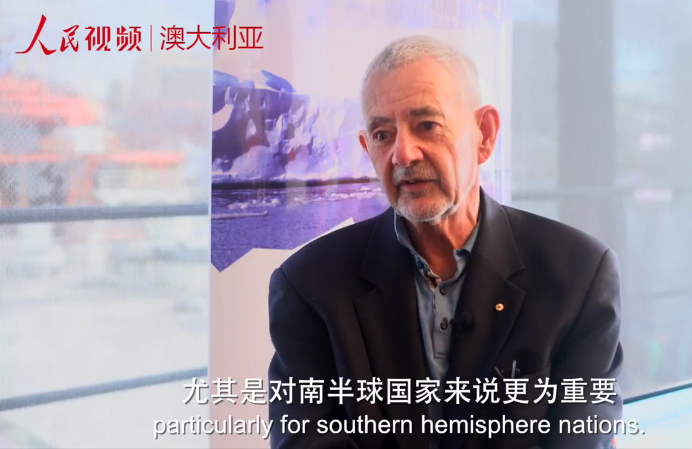

 |
Having travelled to Antarctica a total of 25 times, glaciologist Dr. Ian Allison believes it’s crucial to study Antarctic science in order to protect the future of our environment. In an interview with People’s Daily Online Australia, Dr. Allison asserts that China’s achievements in protecting and utilizing Antarctica have also developed significantly.
Australia and China’s relationship regarding Antarctic science has evolved drastically over time, but Dr. Allison believes it all started with China’s science industry learning how they could operate in an extremely cold environment.
“I think China is now almost a big brother to Australia, in its own skills, [it has] developed its own capabilities. It is probably greater than Australia now.”
Dr. Allison has worked across several areas including researching ice sheets, mass balance and the dynamics of ice sheets. He has had the opportunity to travel to inland Antarctica for work, and has led two voyages on a ship to Antarctica in the middle of winter.
Dr. Allison emphasises three primary reasons why is it important to research Antarctic science.
“One is, with climate change, the ice sheet has a possibility of melting and adding to sea level rise.”
“The ocean, the atmosphere and the sea ice in Antarctica are very important for our daily weather systems, particularly for southern hemisphere nations.”
“If you recover ice cores from Antarctica, you can find out what has happened to the climate in the past, going back hundreds of thousands of years, and knowing what has happened in the past helps us to understand what might happen in the future.”
Dr. Allison’s professional relationship with China began in the late 70s with China initiating their Antarctic research program.
“For many years, from about 1981 onwards, Chinese scientists went to Antarctica with Australian expeditions. Some of those people that were studying ice and snow and came through our area, we helped train them before they went. [We] worked with them on projects and many of them went back and became very influential figures in Chinese science,” said Dr. Allison.
For the last three years, Dr. Allison has also worked as chief editor for the journal ‘Advanced in Polar Science’, which was published in Shanghai. Before this role, he worked as a senior visiting professor at the Chinese Academy of Sciences for three months.
He emphasises that research and expeditions to Antarctica are relevant to people’s daily lives because it affects our weather systems.
“One of the more important climate factors involving Antarctica is sea level rise. As the world warms, we are losing ice from ice sheets in Greenland and Antarctica and that is causing the sea level to rise… Melting in Antarctica and Greenland will occur for hundreds of years into the future.”
“Certainly [with] the resources that China has put into the facilities, I think China takes its role in protecting the Antarctic environment very seriously,” Dr. Allison said.
China currently collaborates with Australia on a project that measures the weather with automatic weather stations positioned on the highest part of Antarctica’s ice sheet, known as ‘Dome A’. Australia and China have also collaborated to measure thickness of ice and the geophysical properties of the ice from an aircraft.
In regards to China’s opening up and reform, Dr. Allison states that scientific collaboration between China and Australia have continued to develop.
“I think it has been a continual opening up, the exchange has become easier, partly because policies have become more open but also because Chinese scientists have become more proficient in what they are doing,” Dr. Allison said.